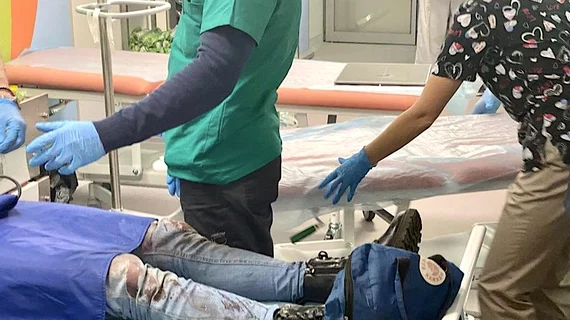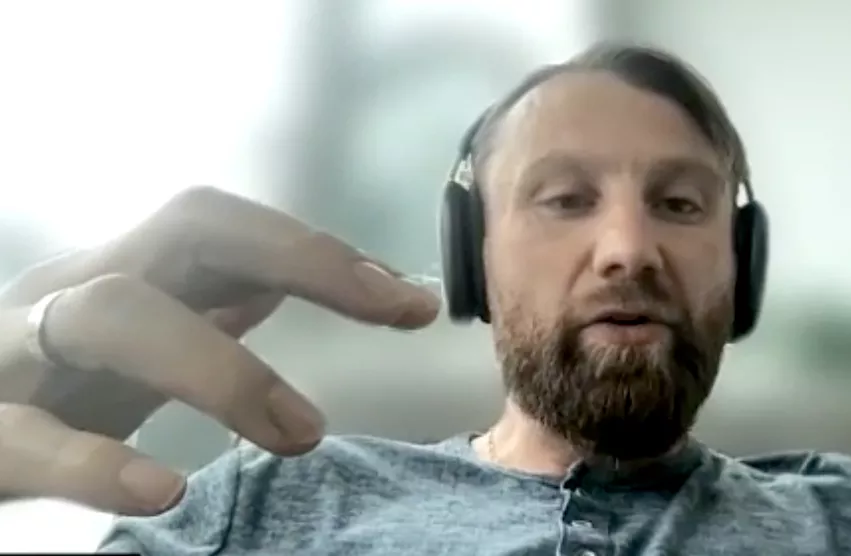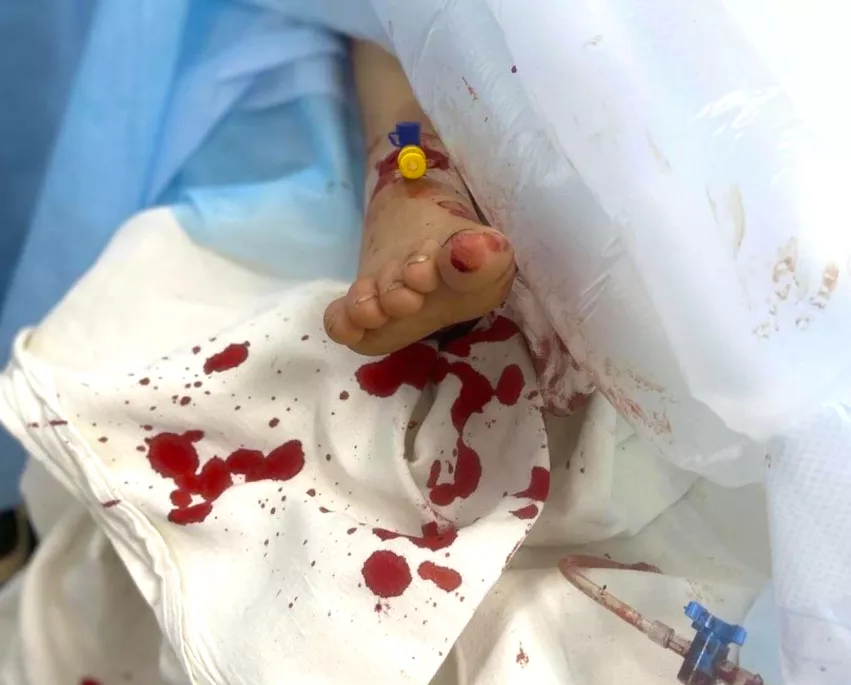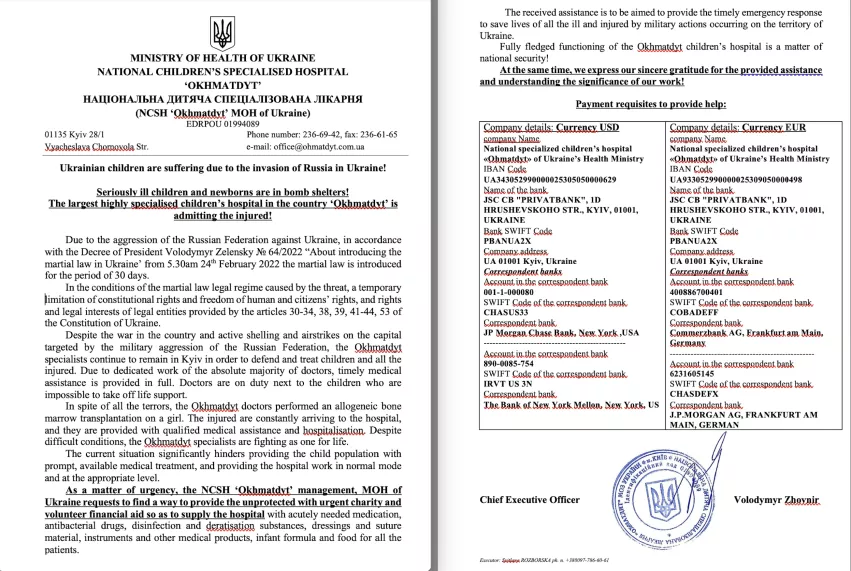War in Ukraine: Perfusionist from Ukraine asks clinicians to help his homeland
After hearing from friends and family in Ukraine that the Russian invasion in late February was real, Kyrylo Chasovskiy, a pediatric perfusionist and supervisor at the British Columbia Children's Hospital in Vancouver, Canada, said he was paralyzed and in shock. However, he decided to respond by heading efforts to mobilize funds and supplies to send to the pediatric hospital he formerly worked at in Kyiv.
Chasovskiy, who previously worked in the ICU and as a perfusionist at the Center for Pediatric Cardiology and Cardiac Surgery in Kyiv, Ukraine, felt helpless hearing about the situation at his old hospital as the Russian invasion crept closer.
"When I heard this, my first reaction was denial. I can't believe it, it's impossible. Like it was so mind blowing that something like this would happen in the 21st century," Chasovskiy explained. "It took me probably several hours of searching online and talking to my connections in Ukraine when I received one message from a person I trust very much and I told them I heard about bombings. The answer was, 'it's a war.' And then there were several days of just pain, tears, trying to communicate with relatives and friends, and trying to understand the picture."
Though thousands of miles away, Chasovskiy realized he might be able to mobilize healthcare workers in Canada and the U.S. to try and make a difference.
"Somewhere deep inside I realized that I needed to get together with the local communities and start doing something right away. The very first day at work after this all began, I connected with my managers and talked to them. I said, look, I'm going to put together this email and I need your support and help by endorsing and distributing this," he said.
His letter requesting help for his old hospital was quickly published by the Canadian Society of Clinical Perfusion (CSCP). Physicians at his hospital and elsewhere began sharing the letter with peers and work spread quickly. He gave direction for clinicians in North America looking for ways to help Ukraine.
"Please believe me when I say that Ukraine is fighting for its freedom and independence," Chasovski wrote in his letter published by the Cardiac Society of Clinical Perfusion. "My family, my parents and friends, all Ukrainians are facing the biggest war since World War II. The scale of this war is unbelievable and will change the world for many decades. The Ukrainian army is fighting back, brave and strong! It has support of its government, armory and defense systems. They still need provisions, medicine, and disposables however. All Ukrainians these days are donating to their army, especially those who are living abroad, in particular Ukrainian Communities living in Canada. I have called this place home for many years now. Today, I am asking for help. Not for me, but for Ukraine."
He said the Ukrainian Canadian Congress (UCC) and the Canada-Ukraine Foundation (CUF) established of a Humanitarian Relief Committee to organize relief efforts and funding from Canada. "I am asking you to consider making a little contribution to the foundation. Even a small commitment will make difference," Chasovski said. He said donations in support of humanitarian relief can be made at either the Canada-Ukraine Foundation or Red Cross.
Chasovski shared the fundraising link for the Canada-Ukraine Foundation — www.canadahelps.org/en/dn/70605
He also has a letter from his old hospital in Ukraine that listed how to donate funds directly to the National Children's Specialized Hospital. A copy of that letter is at the end of this article.
Ukraine's largest children's hospital treating wounded children
Chasovski is trying to help directly support friends at the National Children's Specialized Hospital (Okhmatdyt), which is next to the Center for Pediatric Cardiology and Cardiac Surgery. It is Ukraine's largest children's hospital and continues to operate despite shelling and air strikes by the Russian army. Doctors stay on duty there partly because some of the children treated their for war injuries and more common conditions like cancer cannot be removed from life support.
The hospital started receiving wounded the first night of the invasion, including three adults and children. The hospital continues to post images each day on its Instagram account to show the outside world what is happening. This includes graphic images of children wounded by Russian rifle and artillery fire.
The current situation at the hospitals in Kyiv
Chasovski worked at the Center for Pediatric Cardiology and Cardiac Surgery in Kyiv, Ukraine, until 2016, when he immigrated to Canada. The hospital is about 1.5 miles west of the city center. He was been in regular contact with former co-workers who are still there and plan to stay on the job to do their part.
"Many of them have been living in the hospital since day one of the war," Chasovski explained. "They had to move most of the patients wherever they can into the basement, or those parts of the building that are most secured because the bombing is still happening. And just yesterday, I had a conversation with my colleague, who's working at the hospital, saying there was a huge missile just above the hospital and it landed very close to the hospital. It damaged certain parts of the buildings."
Ukrainian air defenses had shot down a Russian cruise missile over the city and it crashed on the hospital grounds, shattering windows and damaging a door.
"I know there are almost 40 kids already dead officially in Ukraine and another 70 severely injured in a different hospitals. Those patients require lots of like simple things, diapers for small infants, formula, milk and all of that. And they need medicine and antibiotics, and all of those things are extremely expensive in Ukraine," Chasovski said. "I'm raising funds right now to help right now. But when the war is over, there will be so much more help needed to restore, to rebuild, the country and the hospitals."
He said there is already a very noticeable psychological toll taking place as well.
"After all these bombings, my friends were telling me yesterday, 'you should see the how the eyes of those kids changed. They're blank, they have no emotions, they don't cry anymore. They don't laugh anymore.' They will need so much help and support to get their lives back," Chasovski said.
He added that the need for supplies is growing, while the number of injured coming in is increasing. However, despite the dire situation, the goal of providing quality care continues to be repeated over and over by Chasovski and physicians at the hospital in social media comments.
"At this point, I think all they want is to survive, simply to survive another night. And second of all, they want to provide the best care they can to those patients. For an institution like this, a big hospital that already has access and established relationships with venders where the logistics is in place and you don't have to create something on the fly, I think money would do the best currently to help them," Chasovski said.
Chasovski's hometown in Ukraine is being shelled by the Russians
Chasovski is from the town of Irpin, a suburb northwest of Kyiv. It is about two miles south of the Hostomel airport Russian forces captured during their initial invasion before Ukrainians were able to take it back. The town has been under regular Russian artillery and mortar fire for more than a week now.
"My father and my family left for Europe just a few days before it became a real nightmare, and they are safe right now," he said.
Chasovski said his hometown and many of the towns his family moved through trying to get out of the country already had basic services cut off due to the fighting and Russian air strikes.
"From what I know, the town they left and the nearby towns over there, they don't have water. They don't have electricity. They have no cell service connection. And not everyone can leave the place, like people with small children, old people on the top floors of buildings. For them it's quite difficult. I have a friend living there whose cell phone has no power and there is no electricity to recharge it. So they are separated from the outside world completely," he said.
Canada has a large Ukrainian population
Canada has one of the largest populations of Ukrainians outside Ukraine, Chasovski said. He said out of Canada's population of about 35 million people, and there are almost 1.4 million citizens who consider themselves as Ukrainians, born in Ukraine, or have Ukrainian roots. Read more
Related Healthcare War in Ukraine Content:
Cardiac hospitals still treating patients as war in Ukraine continues
War in Ukraine: Doctor from pediatric cardiology clinic shot dead
PHOTO GALLERY: Radiology images of Ukrainian trauma patients wounded in war
War in Ukraine has not stopped congenital heart surgeries in Kyiv
U.S. government, American Hospital Association warn of potential Russian cyber attacks
Radiology leaders speak out in support of Ukraine
Cardiologists across the world share support for Ukraine as violent war continues
Radiologists in Ukraine helping the war effort as Russia continues to attack
U.S. government, American Hospital Association warn of potential Russian cyber attacks




